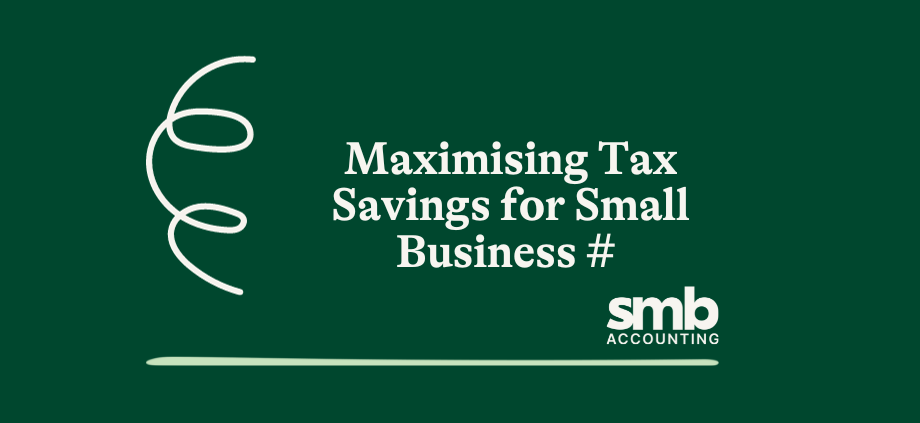Maximising Tax Savings for Your Small Business: Essential Strategies
Tax planning undoubtedly plays a pivotal role in the financial success of any small business. With an overwhelming number of tax rules, regulations, and deductions affecting your bottom line, it’s crucial to have a solid understanding and proactive approach to tax-saving opportunities. Effectively managing your taxes requires expert guidance, strategic planning, and timely action, which can significantly enhance your business’s profitability and financial stability.
In this post, we will delve into essential tax-saving strategies for small businesses. Leveraging these strategies, coupled with the expert guidance of SMB Accounting, can help you maximise your tax savings and financial success.
By providing actionable tax-saving strategies and expert guidance, we aim to empower small business owners with the knowledge and tools required to navigate tax regulations more effectively. Maximising tax savings and maintaining compliance requires expertise, proactive planning, and timely execution, all of which can be facilitated by engaging with the right partner, such as SMB Accounting. Let our team of dedicated professionals be your guide, ensuring you make the most of your business’s financial potential, tax savings, and overall success.
1. Understanding Available Tax Deductions
Tax deductions can considerably reduce your small business’s taxable income and, subsequently, your tax liability. For this reason, it’s crucial to understand the deductions available to your business. Some common tax deductions for small businesses include the following:
- Operating expenses: Most day-to-day expenses incurred in running your business can be tax-deductible. These may include office rent, utility bills, employee wages, and insurance premiums, among others.
- Depreciation: Depreciation allows you to claim deductions for the wear and tear of business assets, such as vehicles, machinery, and equipment, over their effective life.
- Work-related deductions: Business owners can claim expenses related to the business use of their home, vehicles, and travel expenses.
- Specific deductions: Some small businesses may be eligible for industry-specific tax deductions, such as research and development expenses for tech startups.
Understanding and leveraging these tax deductions can help you reduce your taxable income and potentially lower your tax liability.
2. Maximising Business Expense Claims
Tracking and claiming your business expenses correctly can significantly impact your tax savings. Here are a few tips to help you maximise your business expense claims:
- Categorise expenses: Separate your business expenses from personal expenses and categorise them based on their nature, such as office supplies, travel, or advertising costs. This will enable you to claim relevant deductions accurately.
- Recordkeeping: Maintain systematic records of your invoices, receipts, and other transaction documents. Accurate recordkeeping will help you track expenses more efficiently and ensure you claim all eligible deductions. Further, the Australian Tax Office (ATO) requires businesses to retain records of business expenses for five years.
- Automatic expense tracking: Use accounting software like Xero to track expenses automatically, import bank transactions, and attach digital copies of receipts. This not only simplifies expense management but also ensures that no deductions are missed.
3. Leveraging Tax Incentives and Credits
The Australian government provides various tax incentives and credits to support small businesses, and it is essential to stay informed about the opportunities available. Here are a few examples:
- Instant asset write-off: Enables eligible small businesses to claim an immediate tax deduction for the business portion of the cost of assets, like vehicles, machinery, or equipment, purchased during the financial year. It’s important to review the eligibility criteria and thresholds for this incentive regularly, as they may change.
- Small business concessional tax rates: Concessional tax rates apply to some small businesses, allowing you to pay reduced taxes on your business income. Ensure you meet all requirements and eligibility criteria to make the most of these reduced rates.
4. Implementing Effective Tax Planning Strategies
Proactive tax planning is crucial to maximise your small business’s tax savings. Here are some strategies to consider:
- Income deferral: If possible, defer income to the next financial year when expecting a lower taxable income. This may help you reduce your tax bracket and overall tax liability.
- Prepayment of expenses: Prepaying deductible expenses, such as insurance premiums or professional subscriptions, can help increase your deductions for the current financial year.
- Contributing to superannuation: Consider making concessional superannuation contributions to help lower your taxable income and save for retirement simultaneously.
When implementing tax planning strategies, it is crucial to consult with a tax professional like SMB Accounting to ensure these strategies align with your business’s needs and comply with relevant tax laws.
5. Expert Guidance from SMB Accounting
Successful tax planning and compliance go beyond understanding rules and regulations; they require the support of knowledgeable and dedicated professionals. SMB Accounting can help you maximise your tax savings and promote your business’s growth through our range of tailored services.
- Tax planning consultations: We offer comprehensive tax planning consultations, ensuring you make well-informed decisions while maximising savings and considering potential business growth.
- Compliance management: Our team of expert accountants helps you maintain tax compliance, minimising the risk of penalties and providing peace of mind.
- Tax return preparation and lodgement: We ensure the accuracy and timeliness of your tax return preparation and lodgement, maximising your savings while avoiding unnecessary issues with the ATO.
Conclusion
Effective tax management is undeniably vital for your small business’s financial success. By understanding available deductions, maximising expense claims, leveraging tax incentives, executing strategic tax planning, and engaging with experts like SMB Accounting, you can significantly enhance your business’s growth potential and long-term profitability.
As your trusted partner, SMB Accounting is committed to helping you navigate the complex world of taxes, ensuring your business thrives and prospers on the road to financial success. We provide individual tax returns, small business accounting with various small business accounting packages available, SMSF audits, and more. Contact us today if you need assistance with your tax return on the Sunshine Coast!

